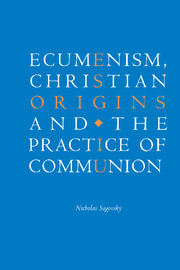Book contents
- Frontmatter
- Contents
- Acknowledgements
- List of abbreviations
- 1 The common life
- 2 Communion: Anglicans, Roman Catholics, and ecumenical consensus
- 3 Plato's vision
- 4 Aristotle's revisionism
- 5 Covenant and community
- 6 Little communities and the Catholic church
- 7 Cappadocian koinonia
- 8 Augustine and the story of communion
- 9 Ecumenism and the practice of communion
- Select biblography
- Index
2 - Communion: Anglicans, Roman Catholics, and ecumenical consensus
Published online by Cambridge University Press: 22 September 2009
- Frontmatter
- Contents
- Acknowledgements
- List of abbreviations
- 1 The common life
- 2 Communion: Anglicans, Roman Catholics, and ecumenical consensus
- 3 Plato's vision
- 4 Aristotle's revisionism
- 5 Covenant and community
- 6 Little communities and the Catholic church
- 7 Cappadocian koinonia
- 8 Augustine and the story of communion
- 9 Ecumenism and the practice of communion
- Select biblography
- Index
Summary
In the last thirty years, ecumenical discussion of every kind has proliferated. During that time – broadly speaking, since the Second Vatican Council (1962–5) – the theology of koinonia/communio (to set the Greek and Latin terms side by side) has all but swept the board. Here is a way of presenting the Christian faith that takes in a fundamental concern with God as Trinity (koinonia in God), with human beings as made for koinonia, with ecclesiology and the doctrine of salvation (koinonia with God and with other human beings), and ethics (living in and for koinonia). It engages with much wider debates in society about community, about what it means to be a person, and about human relations. The theology of koinonia is a theo-logy (a study in the working, in the ‘logic’, of God) which comes to a focus in study of that unique community, or community of communities, which is the Christian Church. This ecclesiological focus is, perhaps, why it has been so widely developed and so much drawn upon within the ecumenical movement.
Within the ecumenical movement, with Roman Catholics and Orthodox as active participants, Christians have been forced to reflect in new and creative ways on what it means to be Church; that is, on what grounds we (I write as a Christian) recognise others as Christian, on what grounds churches make that claim of themselves or recognise it when made by others, how we determine whether we share ‘the same’ faith, how we determine the permissible diversity in expressions of faith, what would have to change for Christians to admit one another to be, in the fullest sense, ‘sisters and brothers’, and how we progress towards that longed for goal in which Christians, with all their diversity of tradition, work and live together as one Church in the world.
- Type
- Chapter
- Information
- Publisher: Cambridge University PressPrint publication year: 2000
- 1
- Cited by



